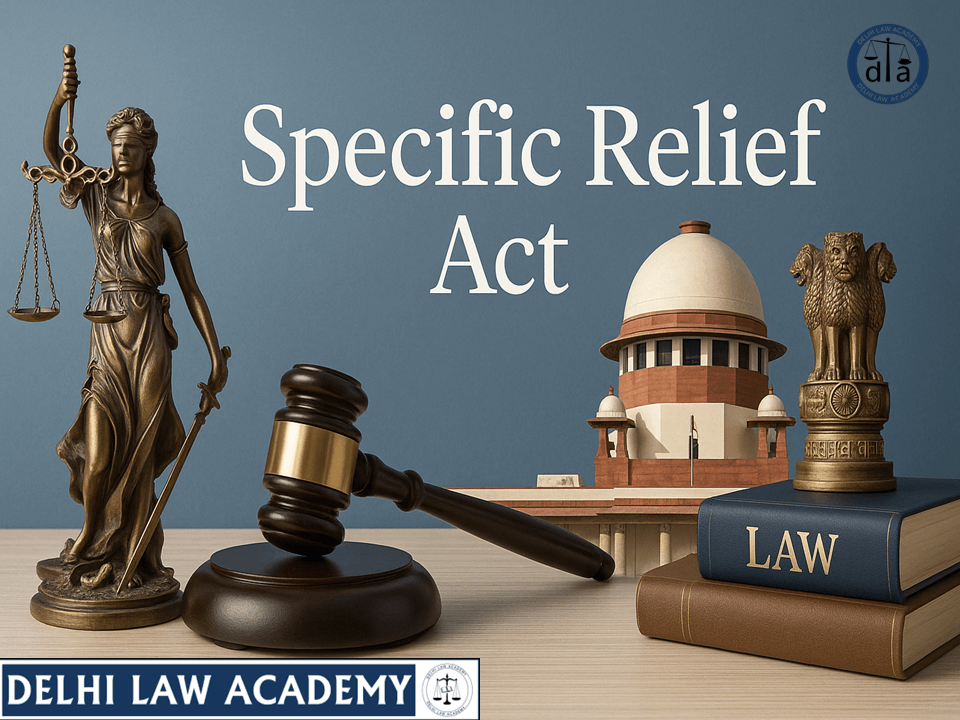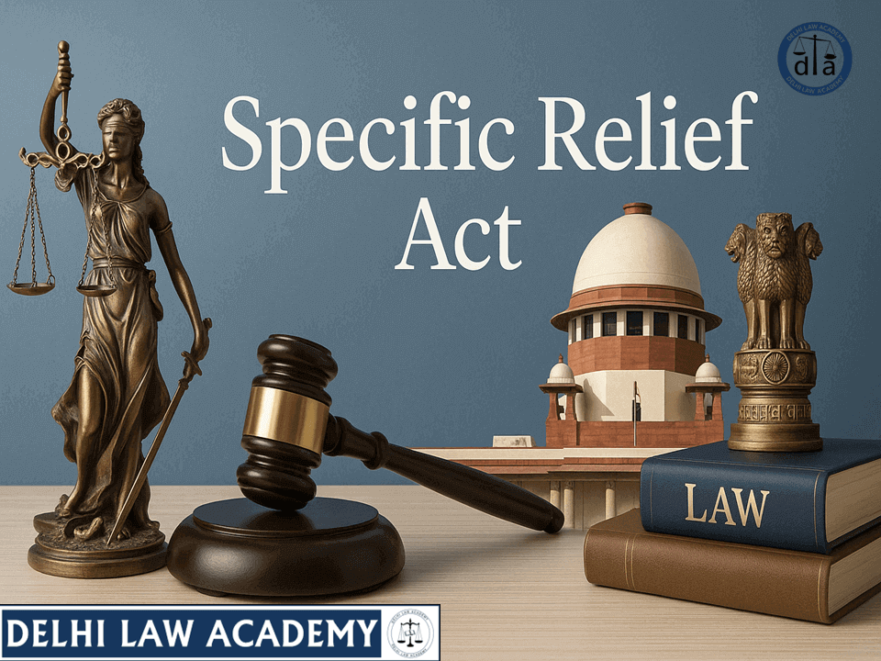
🏛️ SUPREME COURT ON SPECIFIC PERFORMANCE OF CONTRACT
📌 KATTA SUJATHA REDDY V. SIDDAMSETTY INFRA PROJECTS [2022]
“The claim of purchaser is hit by delay and laches on their part as they did not take appropriate measures within the stipulated time and filing of the suit was delayed by almost five years.”
Delhi Law Academy Jaipur presents below for aspirants of Rajasthan Judicial Service (RJS), DJS, PCS (J) and other Judicial Services throughout India a very important judgment of the Supreme Court of India explaining the requirements of Section 16(c) and Section 12 of the Specific Relief Act.
Presented below: Summarized version by Delhi Law Academy Jaipur of the Supreme Court Judgment in the case of Katta Sujatha Reddy v. Siddamsetty Infra Projects [2022]. Original language of the judgment has been maintained; it has not been disturbed or replaced.
📚 KATTA SUJATHA REDDY V. SIDDAMSETTY INFRA PROJECTS [2022]
⚖️ J U D G M E N T
Siddamsetty Infra Projects, the respondent, had filed a suit for specific performance against the appellants.
📝 A conspectus of the facts
On 26.03.1997 and 27.03.1997 two agreements to sell were executed between the vendors and purchaser for two separate parcels of land. The sale considerations for the aforesaid land were Rs.38,37,500 and Rs.1,82,500 respectively. Out of the above sale considerations, the vendors received an advance of Rs.34,70,000 and Rs.10,850 in furtherance of the performance of the aforesaid agreement. The remaining amount of Rs.5,39,150 was to be paid within 3 months. This amount had admittedly not been paid within the stipulated time.
A notice was despatched by the purchaser on 31.03.2000, calling upon the appellants to execute the sale deed at a convenient date, suitable to the vendors. The vendor replied to the aforesaid notice by letter dated 14.04.2000 by stating that the purchaser never offered to pay the balance sale consideration and issuance of the notice was nothing but a subterfuge to get over the limitation. Thereafter, a suit was filed by the purchaser only on 09.08.2002.
⚖️ Issue C: Whether the purchaser is entitled to the relief of specific performance?
From the above, it is clear that the 2018 Amendment Act is prospective and cannot be applied to the present set of facts. Under the earlier law, grant of specific performance was discretionary. However, it was mandated that such discretion ought to be used in a principled manner without leaving scope for any arbitrary application.
From the aforesaid, it is clear that the purchaser ought to have been vigilant in the case at hand to enforce his right and could not have been lackadaisical in his approach. From the facts, it is clear that the purchaser had entered into an agreement way back on 26/27.03.1997, which had a clause mandating completion of the contract by payment of the remaining consideration within three months. The aforesaid clause was drafted, as alluded to earlier, for providing one last opportunity for the purchaser to make good their lapse which had happened on the earlier occasion. In this context, the time for performance of the contract including the payment lasted till the month of June 1997.
It was necessary that the purchaser should have taken immediate steps to complete the transaction and if such steps were immediately completed then the purchaser would have a clear right for seeking enforcement for 3 years reckoned from the last date decided for completion of the contract.
The notice dated 08.02.2000, issued on behalf of the purchaser implicitly acknowledges the fact that time was considered as the essence even by the purchaser themselves and due to breach of the same, they sought novation of the agreement to sell. The next aspect which this Court needs to consider is whether the parties had requisite willingness and readiness to perform the contract.
It is clear that in order to prove readiness and willingness, the burden is on the purchaser to prove that they were always ready and it is only the vendor who refused to perform the contract for extraneous considerations.
It is clear that the purchaser did not voluntarily adhere to the time stipulation under the contract. In order to bypass the condition of time being the essence, the purchaser invoked the standard of good faith. Aforesaid standard prescribes a higher duty of care for parties entering into a contract. Unless such duty is expressly stipulated, good faith standard cannot be implicitly read into any contract.
This Court does not subscribe to acceptance of a general standard of good faith to imply broader good faith obligations only to give a goby to the explicit conditions for maintaining the sanctity of contract. This Court agrees that such an implicit reading would come into play post the 2018 Amendment which enables specific performance of contracts to uphold their sanctity. However, from the facts and circumstances of this case, we cannot accept that such higher standards of good faith was relevant.
In the light of the above, it is clear that Section 16(c) of the Specific Relief Act would only come into force if the purchaser was ready and willing to perform the contract within the three month period prescribed under Clause 3 of the agreements. The aforesaid conclusion is also bolstered by the fact that specific performance can only be granted when essential terms of contract are not violated in terms of Section 16(b).
From the above, we can safely conclude that the purchaser was not ready or willing to perform his part of the contract within the time stipulated and accordingly, specific performance cannot be granted for the entire contract.
The last aspect which we need to consider in this matter is whether possession was with the purchaser after entering into agreements to sell in 1997. If the agreement of sale is coupled with possession, it requires stamp duty and stamp duty has to be paid as per Article 47A of the Stamp Act. Further, asking for the relief of recovery of possession also shows that the plaintiff was not in possession of the property.
⚖️ Issue D: Whether the purchaser is entitled to take benefit of Section 12 of the Specific Relief Act in view of the part payment made?
This issue arises from the fact that the purchaser is said to have paid 90 percent of the sale consideration and in lieu thereof, the High Court has held that the purchaser is entitled to ninety percent of the scheduled land.
It is clear that there was no inability on part of the parties to perform the rest of the contract or the remaining part was waived. In this case, the purchaser breached the essential condition of the contract, which altogether disentitles him to claim specific performance. There is no doubt that the claim of purchaser is hit by delay and laches on their part as they did not take appropriate measures within the stipulated time and filing of the suit was delayed by almost five years.
Therefore, we do not think that it is an appropriate case for granting relief to the purchaser in terms of Section 12 of the Specific Relief Act as the claim of the purchaser is barred by delay, laches and limitation.
We are of the firm opinion that the contract was breached due to the conduct of the plaintiff/purchaser, who were not willing to perform the contract after entering into a time-sensitive agreement. In any case, it is an admitted fact that plaintiff had paid only part consideration. Though there is a forfeiture clause in the agreement, this Court with a view of rendering complete justice between the parties, deems it appropriate to direct the vendors/appellants to repay the said amount with interest @ 7.5% p.a. from the date such payment was made by the purchaser to the vendors, till the entire amount is paid back.
📚 Continue Your Specific Relief Act Preparation
Don’t stop here! Strengthen your knowledge of the SRA with our other fully solved tests:
📘 Free Study Material for Judiciary Aspirants!
Download our FREE study material prepared by Delhi Law Academy’s expert faculty.
Contact us
📍 Delhi Law Academy – Jaipur Branch
6C, Tower 2, Coaching Hub, Pratap Nagar, Jaipur – 302033
📞 Phone:
+91 9911916552
+91 8447285606
✉️ Email:
contactus@delhilawacademy.com

